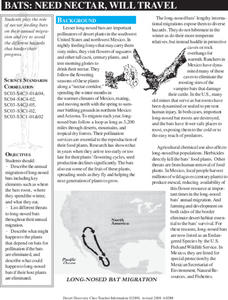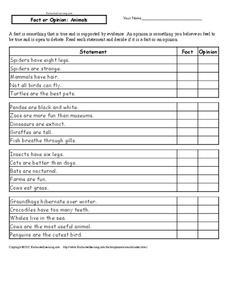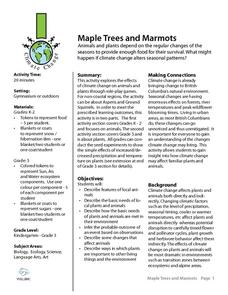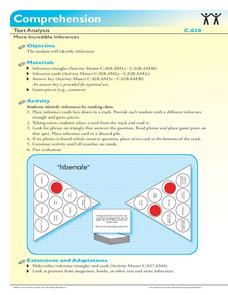Hibernation Teacher Resources
Find Hibernation lesson plans and worksheets
Showing 280 resources
Curated OER
Bats: Need Nectar, Will Travel
Beginning wildlife biologists become adult bats, baby bats, snakes, owls, bobcats, or land-clearing developers in a grand role-playing activity. In a large open space, they play a game in which they move to designated areas based on what...
Curated OER
Celebrating Groundhog Day with your Students
Celebrating Groundhog Day in your classroom is a fun-filled way to explore science, art, and literature.
Curated OER
Chalkboard Challenge
Here's a terrific Jeopardy-style game that's designed for 3rd and 4th grade students of science. The topics include living things, animals, plants, matter, and "hodge-podge." The questions are all age appropriate, and there is an...
National Park Service
News Bearly Fit to Print
There are an average of three human fatalities by bears in North America every year, which is low when you compare it to the 26 killed by dogs and the 90 killed by lightning annually. The lesson encourages researching human-bear...
Worksheet Web
Burrowing Animals – Ground Squirrels
Why do ground squirrels build their homes in the ground? What's so unique about these burrows? Have individuals read about this burrowing animal, and then respond to five short answer questions that assess their comprehension of the...
Curated OER
Fact or Opinion: Animals
How many legs do spiders have? Is that an opinion, or is it a fact? Complete a worksheet with four sets of five questions about different animals and their attributes, noting whether each statement is a fact or an opinion.
Virginia Department of Education
Weather Patterns and Seasonal Changes
Get your class outside to observe their surroundings with a lesson highlighting weather patterns and seasonal changes. First, learners take a weather walk to survey how the weather affects animals, people, plants, and trees during...
CGP Grey
Groundhog Day Explained
What's the difference between Groundhog Gus and Punxsutawney Phil? A lot, if you live in Georgia or Pennsylvania! Learn about the ways different North American regions celebrate Groundhog Day with a fun video.
Curated OER
Blubber Mittens:Adaptation to Cold Climates
Students get a first hand look at the benefit of a "blubber layer" in cold climates through a simulation using vegetable shortening and icy water. Through this simulation, students examine how adaptations help organisms survive.
Curated OER
Going Batty
In this bats worksheet, students read 10 facts about bats. Students also choose the correct words from the box to complete the sentences.
Curated OER
Reptiles and Amphibians
Introduce your class to various reptiles and amphibians. They will meet and identify a representative from each of the four major reptile families, then learn about and discuss reptile characteristics. Next, they will identify and...
K12 Reader
Fungi Are Alive
They are alive even though they are neither plants or animals! Yes, fungi are the subject of this two-part comprehension worksheet. Kids read the article and then use information found there to respond to comprehension...
ARKive
Animal over Winter
Gosh those polar regions can get cold. So, how do the animals that live there survive the long winters? Learners explore how animals adapted to survive harsh wintry conditions by completing a worksheet and comparing animal survival...
Crash Course
To Sleep, Perchance to Dream
Sleep, as another form of consciousness, gets the Crash Course treatment in the ninth video in a 13-part, introduction to psychology course. Information about the four stages of sleep, sleep disorders, and dream interpretation theories...
Wild BC
Maple Trees and Marmots
Kinesthetic activities simulate animal activity as the seasons progress in a lesson that introduces climate change to primary pupils. The kids role-play maple trees collecting what they need to survive, but as each year comes...
Get Set for School
Number Formation Chart
Help young learners write their numbers with a number formation chart. It illustrates the way their pencils should move when they make each number, along with a cute story about what each number is doing and thinking as it is being written.
Handwriting Without Tears
Handwriting Without Tears
Does learning to write leave your kindergartners in tears? Use these easy and memorable strategies to guide their pencils in the right direction. With cute illustrations and simple instructions, your learners will be writing paragraphs...
Core Knowledge Foundation
A Time for All Seasons - Fall
The weather is cooling down and the leaves are starting to change color; fall is right around the corner. Celebrate this special time of year with this earth and life science lesson series that teaches children about the...
Core Knowledge Foundation
A Time for All Seasons - Summer
The sun is shining and the birds are singing, what better time to teach young learners about the fun season of summer. In this week-long science series, children learn how the rotation and orbit of the earth influence...
English Worksheets Land
Animals and Earthquakes
Can animals sense an earthquake before the ground starts to shake? Read two short passages that feature stories about animals that acted strangely just before an earthquake. Learners then answer a few reading comprehension questions...
Florida Center for Reading Research
Comprehension: Text Analysis, More Incredible Inferences
Reinforce inference skills with a learning game! Scholars read scenarios on cards and match them to a written inference on the triangle. The first pupil to match all their inferences wins!
Cornell University
Too Much of a Good Thing?
Continuing their study of beneficial insects, young entomologists discover where in the world some of these bugs are. By labeling, coloring, and using the scale on a map, pupils explore the territories and arrival of the Asian lady...
Cornell University
Wasps and Ladybugs
Can a good bug ever become a bad bug? An elementary entomology resource explores what to do when too many ladybugs or too many bees are in your home and can become a problem.
Virginia Department of Education
A-Mazing Plants
Have your young scientists questioned why plants grow a particular way? Through this learning opportunity, scientists gain firsthand knowledge about how plants develop and various factors that affect rates of growth as they bring plants...
Other popular searches
- Hibernation Migration
- Preschool Hibernation
- Winter Animals Hibernation
- Hibernation and Migration
- Bear Hibernation
- Animal Hibernation
- Hibernation Winter
- Bears Hibernation
- Hibernation in the Winter
- Animal Migration Hibernation
- Animals and Hibernation
- Bear Hibernation and Stories

























